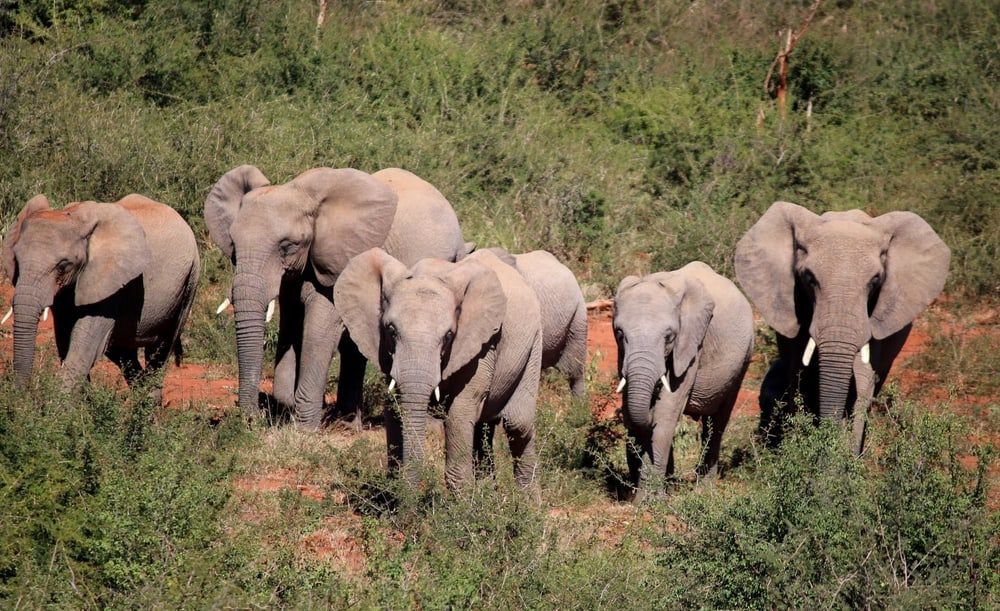In light of World Elephant Day yesterday, CEO of Trafalgar Gavin Tollman has pieced together his thoughts, honouring the silent kings of the animal kingdom.
While the lion may be deemed ‘king of the jungle’, without question, it’s the elephant that boldly, silently and majestically commands the crown of king of all beasts.
I have always admired elephants.
I recall with vivid clarity, back in 1995, being woken with abruptness by a large bull elephant who was alarmingly close to my tent at Chikwenya Safari Lodge, Zimbabwe.
There was nothing but a sheet of canvas between us. A deep sensation engulfed me: be silent, be respectful, enjoy every single second as, after all, you’re not going anywhere until the elephant has finished eating and decided to move on.
Being this close to an elephant, you cannot help but be overawed by their dramatic presence: their might yet delicacy, their natural splendour plus spirituality.
To observe their intelligence, compassion and natural care for one another, to hear their gentle rumble in the distance, to feel the sheer force yet the grace of their being, stays with you forever.
Sunday 12th August was #WorldElephantDay.
It is a day that, admittedly, stops my heart with sadness. Why? Because it symbolises the risk, these magnificent creatures face.
This day was designated for one simple reason: this remarkable species was disappearing at a rate of one every 15 minutes, according to the globally respected Wild Heart Wildlife Foundation.
Worryingly, this day is now critical because of significant government changes.
March 2018. The Trump Administration quietly reversed regulations put in place by President Obama that banned Americans from importing body parts of African elephants killed for the sport of trophies from Zimbabwe and Zambia.
This change of policy was imposed despite the fact that, in the last quarter of 2017, President Trump himself branded big game trophy hunting as a ‘horror show’.
June 2018: The wildlife and diamond-rich African nation of Botswana, home to more than a third of the elephants left in Africa and unlike many of its Southern African neighbours banned trophy hunting in 2014, indicated that legalisation of commercial ivory trade is likely.
Horrifically, Parliament adopted a motion asking the government to consider lifting the ban on hunting and shooting of elephants in areas that are not designated as game reserves and national parks.
How can we call our world civilised when we are initiating a direct threat on some of the greatest gifts from Mother Nature?
FACT: Elephants are only endangered because of humans.
There are a mere 415,000 estimated elephants left in the wild of Africa – a shameful decline from the 3.5 million+ that freely, confidently and innocently walked the continent’s great lands at the beginning of the 20th century.
I urge everyone to play their part and offer some simple steps to tread in the right direction:
- Visit elephants in countries where they live in the wild – tourism benefits the economy and provides much-needed jobs to deter poachers gives you the opportunity to appreciate the beauty, intelligence and emotional capacity of these magnificent giants.
- Do not, under any circumstances or levels of persuasion, buy ivory or other wildlife products. Be an elephant-aware consumer.
- Only promote or travel with safe, ethical elephant tourism organisations. Do not support those that exploit or abuse elephants and other animals for entertainment and profit.
- Actively support healthy, alternative, sustainable livelihoods for people who have traditionally relied on elephants, wild animals and natural resources. Learn about indigenous cultures that have traditionally lived in harmony with elephants.
- Support organisations that are working to protect the habitat for wild elephants and finding solutions for human-elephant conflict.
These magnificent mammals must be protected and allowed to freely wander their natural, wild habits in an uninhibited way.
Let us ensure we are the generation that halted the decline of the herbivorous heroes and made a difference to these magnificent grey animals.
In the words of Sir David Attenborough, speaking on their plight: “Are we happy to suppose that our grandchildren may never be able to see an elephant except in a picture book?”
I for one am most certainly not. I urge you to join the charge.
- READ: Europe’s first-ever elephant sanctuary is about to open
- READ: Here’s another reason to banish elephant rides from your travel itinerary







